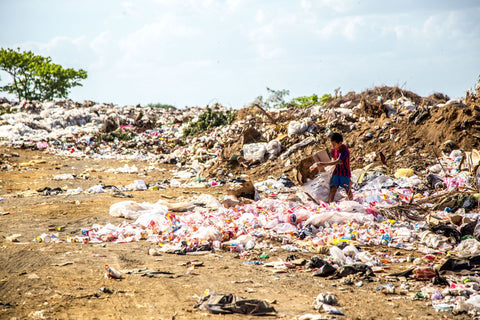
There are a lot of eco-friendly trash bag alternatives out there to choose from right now, but trash bags made from recycled plastic are a no-brainer option. A quick search on Google Shopping brings up dozens of options.
We are going to compare two of our favorite companies using recycled plastic trash bags for hauling your trash.
EVOLUTION TRASH BAGS REPURPOSE PLASTIC PIPES INTO TRASH BAGS
This cool company is making eco-friendly trash bag alternatives from recycled plastic harvested (pun intended) from used plastic farming equipment. The innovative folks at Sustainable Goods Corporation work with companies that supply irrigation tubes to farms. After the season is done, those plastic tubes are collected up and turned into trash bags for you, how cool?!

After a year of using their recycled plastic trash bags, here are some of our takeaways:
- They are sufficiently tough: I realize that there are some out there who have been convinced by commercials that your trash bags should never rip, even if you put a car engine or a basketball hoop in there. I would say these trash bags are slightly thinner than average but for a household who is trying to reduce its waste and divert trash to recycling and compost, I think they work perfectly fine.
- 70% recycled plastic: This is plastic that was going to end up in the landfill anyway but is now repurposed, saving energy and resources.
- Sustainable and responsible business: The company follows sustainable manufacturing practices and is a 1% for the Planet partner.
SEVENTH GENERATION IS A LEADER IN USING RECYCLED PLASTIC
Buying Seventh Generation products is a great place to start if you want to reduce your environmental footprint. Seventh Generation is like a forefather (or fore-mother) of eco-friendly business practices.

Though Seventh Generation is owned by a large multinational corporation, specifically Unilever, the company has taken steps to maintain it’s environmental sustainability and social responsibility goals. Also, Unilever is trying to reduce its negative impact on society as well (see this article from Bloomberg about their efforts).
Although we try to support small businesses as much as possible, I personally feel like it is good to support large corporations that are trying to do right by the Earth. Big companies can equal big change in the world.
Here are some takeaways after using Seventh Generation’s recycled plastic trash bags:
- 55% recycled plastic: Made from recycled plastic, including about a third from post-consumer plastic.
- Certified B Corporation: Seventh Generation is a certified B Corporation, which means they consider the environmental and societal impacts of their business, not just the bottom-line.
WHO WINS BETWEEN EVOLUTION TRASH BAGS AND SEVENTH GENERATION?
After testing both trash bags and researching both companies, we recommend Evolution Trash Bags by a hair:
- Evolution trash bags are ever so slightly cheaper (by two cents per bag)
- Evolution has a higher percentage of recycled plastic
- The box that Evolution trash bags comes in a solid cardboard box that can be repurposed for other uses (we store Matchbox cars in it in our toy closet)
- Evolution trash bags come in a 120 count versus 30 for Seventh Generation’s, though the package is compact and doesn’t take up much more space. If you are a household that strives to reduce waste through composting and aggressive recycling, one box will last you almost a year.
Complaints about Evolution Trash Bags you should consider (in order from valid to borderline frivolous):
- The bags have a straight top, no flaps or draw strings. If you like to fill your trash bags to the brim, that might be a problem for you. Seventh Generation has flaps.
- As mentioned above, if you really care about a super-strong trash bag, you might find these to be too thin. That said, I have never had them rip on me after a year of use, but other reviews have mentioned it.
- Some users complained about the smell of the bags. Of course, you are putting stinky trash in them, so I don’t quite understand that one.
THE PROBLEM WITH PLASTIC BAGS – HOW LONG TO DECOMPOSE

So let us just get this straight – packing all your trash into plastic bags, hauling them off in pollution spewing trucks to be buried in a huge hole in the ground and then covered with an airtight lid is not great for the earth. I think most people understand that.
The plastic bag you use, or the trash you put in your bag, does not decompose, or does so very slowly. In the 90s a professor in Arizona dug up trash from a landfill and found 50 year old newspapers still legible.
Plastic bags, which already take hundreds of years to decompose, will last even longer in the airless, dark environment of a landfill. The unnatural conditions create powerful greenhouse gases and poisonous water that creeps out of landfills, though modern landfills try to capture the byproducts.

In some ways it does not matter what you put your trash in, at least in terms of what happens to it in the future. This is why wasting your money on biodegradable bags is not a good idea, a landfill does not provide the type of environment for them to breakdown naturally.
RECYCLED PLASTIC TRASH BAGS – THE “BEST” WORST SOLUTION
You should reduce your trash by purchasing less, recycling aggressively, and composting. However, I think even the most ardent tree hugger would agree that the overwhelming majority of people will have some non-recyclable, non-compostable trash.
I love all the zero waste folks out there who have shifted their lives so drastically that a year’s worth of trash fits in a small jar. I just don’t think most people are going to achieve that type of lifestyle.
The best solution for our unfortunate throw-it-out culture is buying a recycled plastic trash bag. Using recycled plastic has significant environmental benefits, including (percentage estimates from an Evolution life-cycle analysis):
- Less greenhouse emissions as compared to virgin plastic bags (Evolution estimates 37% less)
- Saves energy (53% less)
- Significantly less air pollution produced (50% less particulate matter, 31% less ground level ozone)
- A large percentage of overall U.S. emissions comes from the mining, creation, consumption, transportation and disposal of consumer products (www.preserve.eco), all of which is reduced by using recycled materials.
Photo credits:
Photo of red trash bags by Sri Lanka on Unsplash
Photo of landfill by Hermes Rivera on Unsplash
Photo of old papers by Denny Müller on Unsplash